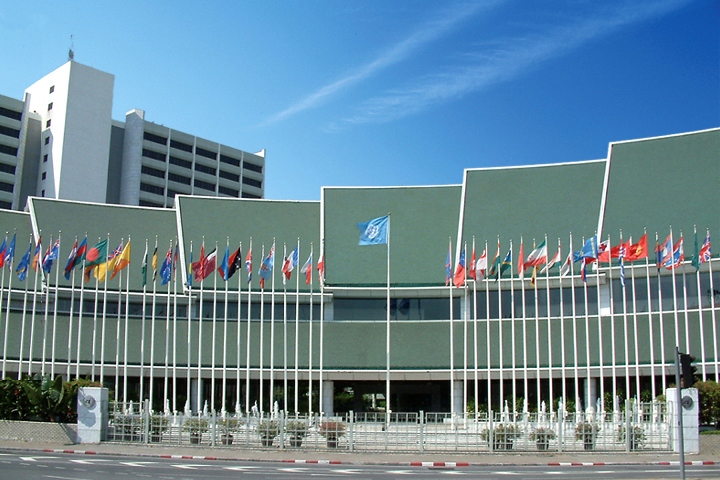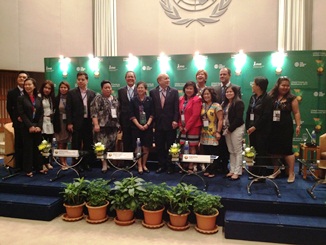
 |
||||
As the Global Forum on Remittances drew to a close Wednesday afternoon, the mood among more than 350 participants was one of pleasant surprise. Private sector, civil society and even regulators, it seems, had much more in common than they imagined.
“There are a number of key messages to take away from here,” Leon Isaacs, Managing Director of the International Association of Money Transfer Networks told GFR Update.
“There is more momentum to the linkage between remittances and development, but there also seems to be more empathy between private sector and the goals of the public sector,” he said. “As an industry I think we’re maturing.”
Friends in high places
Central bankers are often booed as grinches, bottlenecking the remittance expressway with miles of sticky red tape. But in presentations and panels, dynamic Asian policymakers wooed the crowd, showing that an enlightened regulator could be a powerful ally.
“If heard, that simple message could lay a pathway out of exclusion and misery for some of the poorest people on earth – those living in the world’s rural outposts,” said Pedro de Vasconcelos, manager of IFAD’s Financing Facility for Remittances.
“Those regulators show what can be done, shame on those who haven’t done it,” said veteran remittance expert Donald Terry.
Private sector panelists, from industry giant Western Union to Filipino mobile phone companies showcased exciting innovations and collaborations while making it clear they were committed to bringing transfer costs down in line with the G20’s ‘5 percent in 5 years’ initiative, especially if they could carry on making money.
Afterword from the organizer - by Pedro de Vasconcelos, IFAD
 |
||||
|
Pedro de Vasconcelos, Manager, Financing Facility for Remittances, IFAD
|
|||
Remittances are an enormous potential force for human development. Nearly half a trillion dollars are sent back home each year by migrant workers – that’s much more than the entire economy of the United Arab Emirates, and five times Official Development Assistance. Faced with staggering sums like this, it’s easy to forget about the people behind the numbers and the sacrifices they make in order to get cash back to their families.
When a migrant worker sends back $100 to his family, what he is sending back, in essence, is hope -- hope of a better life for his sons, grandchildren and future generations.
Each of us who have just attended this forum has the opportunity, and the responsibility to help him. We already knew that as the remittance market grows and becomes more competitive, transfer prices come down, but we saw this week that there really is something for everyone to gain, whether you are a national government, a microfinance institution, a post office or a money transfer operator.
Not so long ago, migrants working away from home had no choice but to send cash back in envelopes, to be stuffed under mattresses. We’ve come such a long way, but we’re nowhere near finished.
Especially in rural areas, some of the poorest places on earth, too many families still have to walk too far to pick up their money, and when they receive it, have no choice but to use it for immediate needs like food, clothing and shelter.
This money could be doing so much more – we saw this week that something as simple as access to a savings account is a step toward turning those who receive remittances into first time investors, more efficient farmers, community business leaders.
Thailand is an inspiring example of the power remittances can have. Money sent back by migrants has helped it grow, and now migrants are coming here, sending hope back to their families in countries further behind on the development path. Each of us who attended this forum is already helping. We shared new ideas and forged new friendships. Let’s put them to work maximizing the impact of ever dollar sent home.
The Philippines – remittances pioneer
 |
||||
This week, one country kept coming up as an example of what you can achieve when state, private sector and civil society all embrace remittances as a cornerstone for development and work together toward making every last peso count.
Far from a regulatory hindrance, the Philippines central bank is a key ally to one of the world’s most dynamic domestic and international transfer markets.
In the private sector, mobile phone company G-Xchange is at the vanguard of cashless transfers and mobile wallet technology, while on the civil society side, Atikha Overseas Workers and Communities Initiative Inc. is a diaspora development pioneer. Filipino remittance entrepreneurs think out of the box.
Over a networking lunch, GFR Update talked to Alfred Tedd C. Santos, a young marketing executive at LBC, one of the many Filipino cargo-courier companies that have turned their hand to money transfers. He said his firm was now sizing up the highly competitive Mexico-US remittance corridor.
And the Philippines keeps on raising the bar -- in just one example of how seriously the country takes remittances, all new mayors must now take a course on migration and development.
At Wednesday’s Innovation Awards Ceremony, two of the three winners – G-Xchange and Atikha – were Filipino. Virgilio Reyes, Philippines ambassador to Rome and a close ally of IFAD, doesn’t find it surprising. After all, Filipinos have had migration in their blood for centuries. “Because of the accident of history, we are a linchpin between the East and the West, he told GFR update. “We’ve had a head start on globalization.”